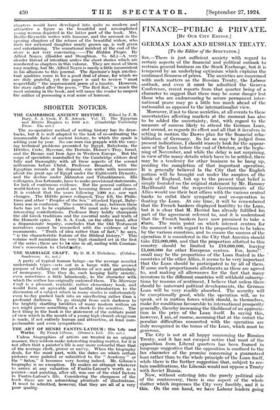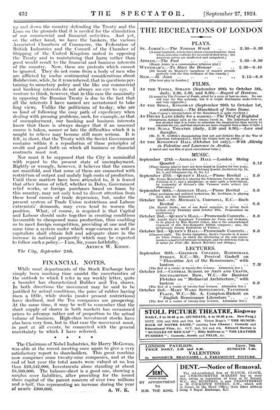FINANCE-PUBLIC & PRIVATE.
[BY OUR, CITY EDITOR.]
GERMAN LOAN AND RUSSIAN TREATY.
[To the Editor of the SPECTATOR.] SIR,—There is just sufficient anxiety with regard to certain aspects of the financial and political outlook to restrain general business on the Stock Exchange, but it is tempered by an underlying optimism which explains the continued firmness of prices. The anxieties are concerned with such matters as the Russian Treaty, the Labour outlook, and even it must 'be admitted the Geneva Conference, recent reports from that quarter being of a character to suggest that there may be some danger lest those who are endeavouring' o secure permanent inter- national peace may go a little too much ahead of the nationalist as opposed to the internationalist 'view.
Moreover, if not to these anxieties, at all events to these uncertainties affecting markets at the moment has also to be added the uncertainty, first, with regard to the measure of success likely to attend the German Loan, and second, as regards its effect and all that it involves in setting in motion the Dawes plan for the financial reha- bilitation of Germany. So far as may--be judged from present indications, I should scarcely 400k for the appear- ance of the Loan before the end of October, or the begin- ning of November, and while the delay is not surprising, in view of the many details which have to be settled, there may be a tendency for other business to be hung up, pending the completion of that important operation. It is generally believed in the City that the 'English portion will be brought out under the auspices 'of the Bank of England, but up to the present that belief is simply founded on the original statement by Mr. Ramsay MacDonald that the respective Governments of the Allies-would use their best offices with the various central banks to enlist their sympathy and co-operation in floating the Loan. At one time, it will be remembered that the Trench bankers displayed hostility to the Loan, but it is clear that M. Herriot has already fulfilled his part of the agreement referred to, and it is understood that the French bankers have now promised to 'take a share. The main point on which interest centres for the moment is with regard to the proportions to be taken by the various countries, and to ensure the success of the operation it is considered in the City that America should take 125,000,000, and that the proportion allotted to this country should be limited to £10,000,000, leaving £5,000,000 for other -European centres. For, howl'. __- small may be the proportions of the Loan floated in the countries of the other Allies, it seems to be very important that the Loan should be participated in by all of them. If some such proportionate allotments as these are agreed to, and making all allowances for the fact that many investors in the different. countries will withhold subscrip-1 tions by reasons of sentiment, I believe that unless there -should be untoward political developments, the German Loan will be very readily absorbed. The security will be exceptionally good, while the operation will, so to speak, set in motion forces which should, in themselves, make for conditions favourable to international prosperity 'generally, thereby increasing the likelihood of an appreeia- tion in the price of the Loan itself. In saying this, however, I am, of course, assuming that at the outset the -peculiar difficulties connected with the operation are duly recognized in the terms of the Loan, which must be generous.
The City is not at all happy concerning the Rusiian Treaty, and it has not escaped notice that most of the opposition from Liberal quarters has been framed in language suggestive that the opposition is confined to the _lax character of the promise concerning a guaranteed loan rather"than to the whole principle -of the Loan itself, while there 'is the further suggestion that, subject to cer- tain modifications, the Liberals would not oppose a Treaty with Soviet Russia.
Now, without entering into 'the -purely political side of the controversy, there is one aspect of the whole rhatter which impresses the 'City very forcibly, and it is this. On the one hand, we have Labour leaders going up and down the country defending the Treaty and the Loan on the grounds that it is needed for the stimulation of our commercial and financial activities. And yet, on the other hand, we have, the bankers, the various Associated Chambers of Commerce, the 'Federation of British Industries and the Council of the Chamber of Shipping of the United Kingdom united in opposing the Treaty and in maintaining that harm rather than good would result to the financial and business interests of the country. Now, these are protests which cannot be ignored. They do not come from a body of men who are afflicted by undue sentimental considerations about Bolshevism, while, be it remembered, that in questions per- taining to monetary policy and the like our commercial and banking interests do not always see eye to eye. I venture to think, however, that in this case the unanimity in opposing the Russian Treaty is due to the fact that all the interests I have named are accustomed to take long views. Unlike the politicians of to-day, who are so fond of following the easy path of expediency when dealing with pressing problems, such, for example, as that of unemployment, our banking and business interests know that there is always danger that if an unsound course is taken, sooner or late the difficulties which it is sought to relieve may become still more serious. It is felt, in short, that the Treaty with the Soviet Government contains within it a repudiation of those principles of credit and good faith on which all business or financial contracts must rest.
Nor must it be supposed that the City is unmindful with regard to the present state of unemployment. Rightly or wrongly, however, it believes that the causes are manifold, and that some of them are connected with restriction of output and unduly high costs of production. Until these ,matters have been. attended to, it is feared that other forms of relief; whether in Doles, Government relief works, or foreign purchases based on loans by this country, may not only tend to divert attention from these local causes of trade depression, but, under the present system of Trade Union restrictions and Labour extremists' demands, may even tend to worsen the position. What, of course, is required is that Capital and Labour should unite together in creating conditions favourable-to cheapened Mass production, thus- enabling us to meet foreign competition, providing at one and the same time a system under which wage-earners as well as capitalists shall obtain full and adequate share in the increase in national prosperity which may. be expected to follow such a policy.-Iitm, Sir, yours faithfully,







































 Previous page
Previous page